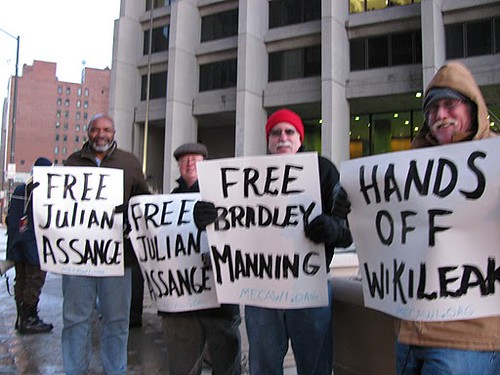
Abayomi Azikiwe and others outside the Detroit federal building demonstrating against the detention of Julian Assange without bail in the UK. The demonstration took place on Dec. 10, 2010. (Photo: Bryan Pfeifer), a photo by Pan-African News Wire File Photos on Flickr.
Assange considers next move after losing appeal
By London correspondent Lisa Millar and wires
May 31, 2012 08:00:03
Julian Assange's lawyers have been given two weeks to consider their next move after the Australian Wikileaks founder's appeal against extradition to Sweden was rejected by the UK's Supreme Court.
Last night the seven-judge panel ruled five to two that Mr Assange's extradition appeal be dismissed and he be extradited to be questioned over sexual assault allegations.
The panel decided Sweden's prosecutor was a judicial authority and therefore the European arrest warrant issued for Mr Assange was valid.
Mr Assange's lawyer Dinah Rose asked for 14 days to consider whether to apply to reopen the case on the grounds that the judgment referred to material that was not mentioned during the last hearing in February.
The judge granted the request, which is highly unusual in the three-year history of the Supreme Court.
"With the agreement of the respondent, the required period for extradition shall not commence until June 13, 2012," the Supreme Court said in a statement.
Mr Assange, a 40-year-old Australian national, was not in the central London court for the judgment.
One of his supporters, journalist John Pilger, said Mr Assange was "stuck in traffic" with his mother, who flew in from Australia for the verdict.
'A very draconian thing'
Geoffrey Robertson QC, an adviser to Mr Assange's legal team, told 7.30 that the UK Supreme Court decision was inevitable and lawyers would now focus on taking the case to the European Court of Human Rights.
"The main issue is the European Court of Human Rights because that is the final court in Europe," he said.
"Certainly he has a reasonable prospect there, but it is unlikely that they would halt the extradition.
"There is a civil liberties issue, because the European warrant is a very draconian thing, and it's probably right in civil liberties terms that it should be issued by a judge rather than a prosecutor."
Mr Assange does not deny that he had sex with two women in Sweden while attending a WikiLeaks seminar in August 2010.
But he insists the sex was consensual and argues there are political motives behind the attempts to extradite him.
The women accuse him of rape and sexual assault.
Mr Assange shot to global fame after WikiLeaks enraged Washington by leaking thousands of secret US documents on the wars in Iraq and Afghanistan and later leaked thousands of US diplomatic cables.
He believes his extradition to Sweden could pave the way for extradition to the US on possible espionage or conspiracy charges relating to the leaked documents.
'We're not involved'
Mr Robertson said an American grand jury had been sitting on Mr Assange for 18 months and could indict him at any point.
"He's far more vulnerable to an attempt to extradite him to America, where of course he will face very serious charges under the Espionage Act," he said.
But US ambassador to Australia Jeffrey Bleich has rejected those concerns, saying any suggestion of a secret US warrant against Mr Assange is an invention.
"There's absolutely no basis for the US to be interested in this," he said. "We're not involved."
Prime Minister Julia Gillard said the Federal Government would continue to offer Mr Assange consular assistance.
Greens Senator Scott Ludlam said the Government had been weak on the issue of assisting Mr Assange, and could be doing more to help him.
"They need to decide whether their allegiances are with Washington or the Australian public, which is, as someone has already said, actually very strongly in support of Julian and his colleagues."
No comments:
Post a Comment